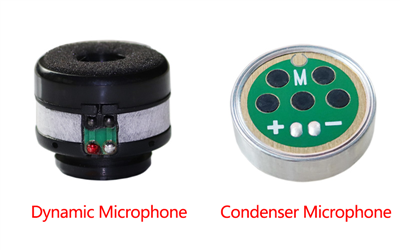The sound quality of a microphone is influenced by various parameters, many of which are directly related to the microphone capsule (also known as the mic element or mic head). Key factors include type, construction, frequency response, sensitivity, and noise level.

1. Type
Different types of microphone capsules have different working principles and characteristics - for example, dynamic microphones, condenser microphones, and electromagnetic types. Each type affects sound quality in its own way.
2. Construction
The internal structure of the microphone capsule significantly affects audio performance. For instance, the quality of components such as the diaphragm, backplate, and capacitor in condenser mics plays a crucial role in achieving clear and natural sound.
3. Frequency Response
A capsule's frequency response determines how accurately it captures sounds across various frequencies. A wider and flatter frequency response usually provides a richer and more accurate sound profile.
4. Sensitivity
Microphone sensitivity defines how well the mic picks up sound. High-sensitivity capsules can capture very faint sounds but may distort with loud sources. Low-sensitivity capsules are better suited for high-noise environments.
5. Noise Level
The self-noise or inherent noise level of a mic capsule affects clarity. Lower noise levels help ensure a cleaner and clearer recording, especially important for studio or professional use.
In addition to these parameters, factors such as the microphone circuit design, connected audio equipment, and environmental conditions also play a role in the overall sound quality. Choosing the right microphone capsule requires a balanced consideration of all these elements based on your application needs.



